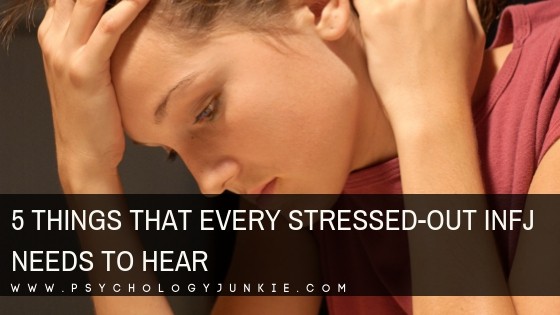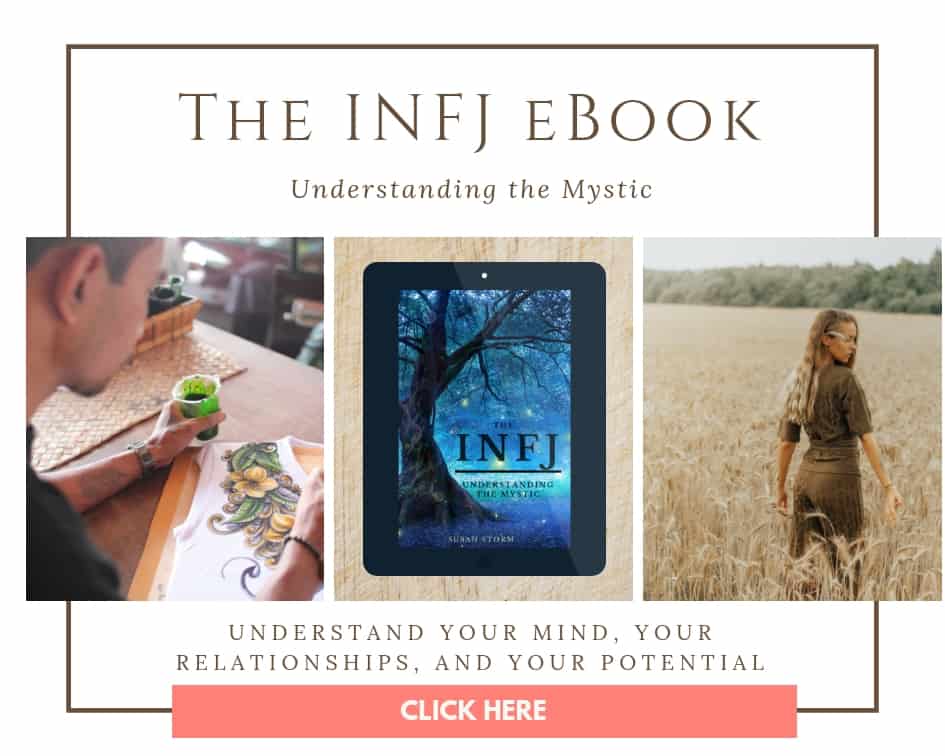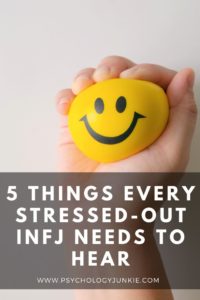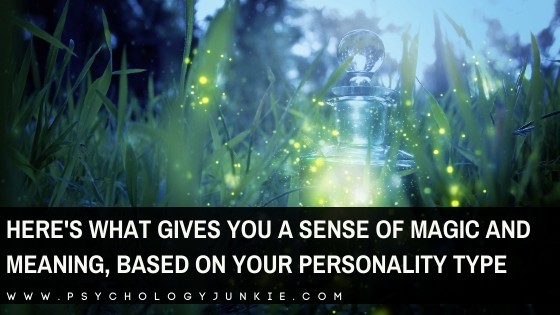5 Things That Every Stressed Out INFJ Needs to Hear
Updated April 28th, 2021
In a world full of distractions, conflicts, and responsibilities, it can be difficult for any personality type to find the peace they so desperately need. Over the years of coaching people of all types, I’ve noticed that there are five unique problems that INFJs struggle with again and again. These struggles are:

- Allowing themselves to express negative emotions
- Finding peace and quiet in a busy world
- Being overwhelmed by other people’s feelings
- Making space for their own needs
- Being misunderstood
Every INFJ I speak with carries this tremendous responsibility for other people’s feelings; they feel responsible for other people in a way that many other types simply don’t. As introverts, they struggle to live like introverts, to honor their own introverted needs. They worry about being misunderstood, and in fact, often are misunderstood because who they are on the outside is often an expression of responsibility more than an authentic expression of self. As an INFJ myself, I relate to these struggles. I’ve been through them and continue to battle with them on a daily basis. But sometimes a few simple words from a friend, partner, or family member can make all the difference! This article is for those people who either A) Need to hear these things for themselves, or B) Need to say these things to an INFJ they care about.
Not sure what your personality type is? Take our new personality questionnaire!
Table of contents
Estimated reading time: 6 minutes
5 Things that Every Stressed Out INFJ Needs to Hear
#1 – It’s Okay to be Angry
As an INFJ you crave a peaceful, harmonious environment and you will go to great lengths to preserve that. While this isn’t always a bad thing, it can mean that you stifle your own anger and frustrations altogether. You may stop yourself from voicing your opinions because you don’t want to disrupt harmony. This is something I personally have struggled with throughout my life. I always felt like anger was a “bad” emotion, one that I should try to channel into constructive methods. It wasn’t until a week ago when I sat across from my therapist telling her (and myself) “No, I’m really NOT angry”, that I realized that it was OKAY to be angry. I needed permission to be angry about some things in my life. Anger is an important emotion. There’s nothing wrong with feeling it or expressing it if in a safe, healthy way. Find a quiet place to park your car and let yourself scream if you need to. Be direct with your feelings and express when you’ve been hurt. Find a friend you can trust and vent to them if you need to. Journal your anger. But don’t continually ignore it and repress it because that can make you feel even worse in the long run.
#2 – It’s Okay to Take Care of Yourself
If you’re an INFJ with a lot of responsibilities you tend to feel like everyone else’s needs are more important than your own. All FJ personality types tend to struggle with putting other people’s needs ahead of their own. This can eventually lead to burnout, overwhelm, and an overflowing to-do list. Don’t guilt-trip yourself for taking some time to rest, recover, and do things that only you find enjoyable. Practice saying “No” to non-essential commitments. Practice saying “I want to do ____” instead of trying to cater to whatever everyone else wants all the time. Caring for others and meeting their needs is admirable, but just make sure you aren’t steamrolling over your own needs at the same time.
#3 – Embrace Quiet
If you’re stressed as you’re reading this, the best thing you can do right now is shut off excess noise. Turn off the TV. Turn off the radio. If you’re a parent, find your kids some quiet activities to do in a separate room. Turn off bright lights. Shut down your computer and turn off your phone. Lights, noise, stimulation, and distractions are all your enemy when you’re stressed. Unplug, quiet things down, and get into a space where you can let your mind just “be” without having to be focused on several things at once.
#4 – You Don’t Need to Protect Everyone Else’s Feelings
As an INFJ you tend to absorb the feelings of the people around you. This results in you feeling the need to take responsibility for other people’s emotions. If someone is sad you try to fix it right away because YOU feel sad. If someone’s angry you try to solve their problem because now YOU feel angry. If someone is depressed you lose motivation and focus because now YOU feel depressed. When you start noticing other people’s emotions bleeding into your own take a conscious step back and remind yourself that those aren’t YOUR feelings. It’s good to be compassionate. That’s something people will love about you. But put up a mental barrier between yourself and the emotions around you so that you can avoid becoming dependent on everyone else being happy constantly. Feeling like your inner serenity is dependent on people with all their own problems and issues is overwhelming. It’s also important to allow other people to deal with their emotions independently sometimes.
#5 – Trust Your Vision
As one of the rarest Myers-Briggs® personality types, you are easily misunderstood. You are always looking for the underlying pattern or meaning behind all things. You read between the lines, think forward in time, and get random epiphanies about how things will play out in the future. People may be skeptical of your ideas and try to back you out of your position. This can result in a feeling of isolation and a sense that your natural way of thinking isn’t “right”. I’m not saying that every single idea or vision or prediction that you have is accurate, but I am saying that you shouldn’t write yourself off quickly. If you’re constantly questioning your instincts and intuitions you’ll wind up stressed and unable to utilize one of your greatest gifts. Create a calm, quiet space where you can let your mind wander. Shut off lights, sounds, and distractions. Write down any thoughts, ideas, or symbols that come to your mind. Over time learn which ideas or predictions are just paranoia and which ones actually have meaning. Practice giving your intuition a “voice” in your life. If you’d like more ideas about how to tap into your intuition, read this article: 10 Intuition Hacks for INFJs and INTJs.

What Are Your Thoughts?
Was this article helpful? Do you have any thoughts or insights to share? I hope that you take these five things into account. Repeat them to yourself when you’re feeling unsure of yourself. Take time for yourself, learn that it’s okay to put yourself first, and practice being comfortable with stillness. Let us know your own thoughts in the comments!
Find out more about your personality type in our eBooks, Discovering You: Unlocking the Power of Personality Type, The INFJ – Understanding the Mystic, and The INFP – Understanding the Dreamer. You can also connect with me via Facebook, Instagram, or Twitter!
Read These Articles Next:
10 Things That Excite the INFJ
7 Things that INFJs Experience as Children
10 Ways INFJs Can Boost Their Creativity

Get Your Free INFJ eBook
As a thank you for subscribing to my newsletter I will send you this free eBook PACKED with self-care tips, creativity hacks, and more! You'll also get a 3-day email course for understanding your personality type better!







Understood. Thank you, Susan.
Great advice. Directed at INFP for sure.
Thanks for this post, Susan 🙂 I really needed a reminder of #4 today (actually for a while now). I had to disappoint someone several months ago and they still seem upset about it, and now every time I see them I drive myself crazy trying to figure out how I could have handled it better. It’s been damaging my “inner serenity” and I really do just need to let go and realize I can’t be responsible for how they might feel anymore.
Thank you so much for writing about INFJ, I only learnt I am one a few years ago, I’m 50 now and my entire life I felt different to anyone else, I’ve been hurt badly by quite a few people over the years as I seemed to attract toxic people who have taken full advantage of my nature, I have now learnt NOT to let those types into my life. So again thank you for your e book and please keep doing what you do. Allyson ????
I seriously need to consideration the points that this article has made I am so thankful that I stumbled across this article and I commend the writer for it . I really need to focus in on those five items especially 4th point when comes dealing with my companion that is bipolar and often time doing her own self medication. I do find myself very drained and trying to deal with her waves of emotions. I find myself i often tiptoe around her feelings.
I don’t think I’ve allowed myself to be angry for over a decade.
Hi Susan! I luv luv luv your articles. I don’t do social media except LinkedIn but will leave comment. As fellow INFJ, I identify with you 99.9999%. 😁😛🤣
My life changing insight, well the main one, came with establishing healthy boundaries and autodidactic polymath pursuits. Love my life now, particularly after 10 years of recovery from drugs and alcohol. No idea it was going to take that long but it was worth it.
Susan, thanks. A lot.
The most important decision for an INFJ like me was to be able to detach consciously from the great gifts we have (the five mentioned in the article)
without repressing them in order to be able to reconnect with my mind and to collaborate fully with it again.
It took almost 23 years to have this trust back with my mind.
Will always keep your precious shots of insights as reminders.
Really appreciate them.
Had I any doubt about being an INFJ, this article laid them to rest. The advice diagnoses the cause of my moods perfectly, and the remedies are life giving. This advice takes care of all my issues -except one. No one but me needs to understand me for me to be happy. The person I miss is me.
A new friend once needed to tell me I was angry. I didn’t believe it but I trusted her and got help learning how to name feelings and process them.
Good tip on processing the visions of the future and sifting out paranoia. My dad had a similar nature. I used to think he worried a lot. Now I see he was forecasting – and not all forecasts are inevitable or our responsibility. Peace and quiet is a balm.
Thank you thank you!
“You don’t know enough to be a pessimist.”